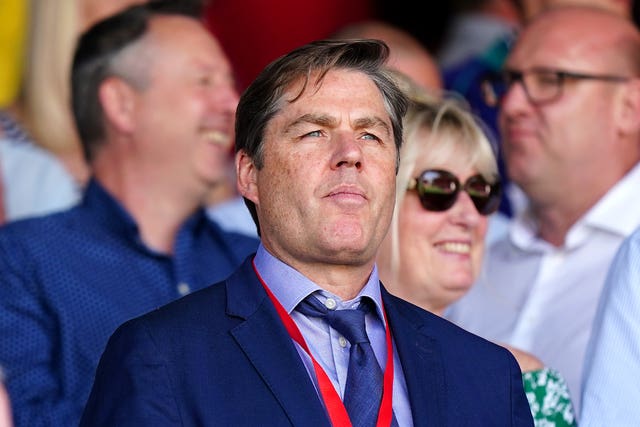Plans for a new independent regulator will put fans “back at the heart of football”, Sports Minister Stuart Andrew has said.
A new White Paper on football governance published on Thursday sets out the proposed scope of the new regulator's powers.
Clubs will be required to adhere to minimum standards on fan engagement as part of a licensing system overseen by the regulator, forcing them to abide by Football Association rules giving fans veto powers over changes of a club's name, badge and kit colour.
The regulator will also have to pre-approve any stadium move, and has powers to block clubs from joining breakaway leagues which do not meet predetermined criteria, following on from the European Super League scandal of 2021.
Any new competitions would need to be meet predetermined criteria, likely to include that they are meritocratic and do not threaten the sustainability of the existing English domestic league structure.
The licensing system will also require clubs to set out their financial plans and how they would respond to shocks, and is working on an enhanced owners' and directors' test covering fitness and propriety, enhanced due diligence on source of funding and robust financial plans.
The regulator would also have targeted powers to resolve disputes between the football authorities on financial distribution. One option under consideration is a binding, final offer arbitration process where the Premier League and EFL each submit a proposal and the regulator chooses the one it feels is most appropriate.
Andrew, addressing the House of Commons, said: “This government has proven time and time again that we err on the side of fans.
“We committed to this review in our manifesto, we stepped in during COVID to make sure English football was one of the first leagues back across Europe.
“We got fans back into stadiums quicker than almost any other country and we took action under competition law to support broadcasting revenues during one of the most difficult periods sport has ever faced. This secured £100million of funding to the game.
“We stepped in once again to block the European Super League, a competition that no fans wanted. When fans have needed us, we have been in their corner and now we are putting them right back at the heart of football.”
The Government is now considering where the regulator will be housed, but is “not convinced” it can sit within the FA. The FA may ultimately have an observer role for the new regulator.
The White Paper said the cost of establishing and keeping the regulator going would represent a “tiny fraction” of club revenues, but estimated that if levies were charged proportionate to club revenues, 50 per cent of the cost would be covered by the six highest-earning Premier League clubs, with the 20 top-flight clubs covering 80 per cent of the cost in total.
A new licensing system would apply to all 116 clubs in the top five tiers, to be phased in over time with grace periods enabling clubs to transition towards compliance. The White Paper said the Government is considering the creation of a non-statutory Shadow Regulator.
The Government promised a fan-led review of football in its 2019 General Election manifesto, following on from the financial collapse of Bury.

Legislation will establish four ‘threshold conditions' all clubs must comply with in order to be licensed by the new regulator.
These are 1) appropriate financial resources, 2) suitable ownership, 3) fan interests and 4) approved competitions. Clubs will also be set specific conditions unique to their circumstances.
Clubs will be asked to demonstrate they have sufficient financial buffers to withstand cash-flow issues and other ‘shocks” and abide by a new corporate governance code.
The regulator will work on an ‘advocacy-first' approach but will have enforcement powers to compel clubs to comply. In extreme circumstances, it will have the ability to withdraw licences from clubs “for persistent, flagrant and wilful non-compliance with licence conditions despite direction and enforcement action”.
The regulator would not have ‘sports sanctions' powers such as point deductions, but could recommend that the FA and/or the leagues do so.
Clubs will have the right to appeal the regulator's decisions to a court or tribunal if they feel it has acted unfairly or outside its statutory remit.

The Premier League has spoken about its concerns of “unintended consequences” from the introduction of a regulator, but the White Paper sought to reassure it by stating: “It is a force for good in promoting the UK abroad, and a product that should be protected.”
The existence of a regulator will not mean that no club goes to the wall in the future, the White Paper said.
“There may be exceptional circumstances in which a club should be allowed to fail,” the Paper states.
“For example, where a club has no viable owner and no interested buyers for an extended period of time, despite the Regulator's best efforts to maintain its asset value.”
The regulator's owners' and directors' test will serve as the minimum standard for new individuals coming into a club.
In describing the ‘fitness and propriety' of new owners the White Paper does not specifically mention human rights considerations, something Amnesty International called for from the Premier League before and during the Saudi-led takeover of Newcastle, and has raised again amid a bid from a Qatari businessman for Manchester United.
One intriguing section of the White Paper says the regulator should determine whether an owner or director is a “politically-exposed person” or PEP, though this should not be the basis to approve or deny an application.
“Political affiliation can expose individuals to bribery, corruption or external influence,” the Paper stated.
“PEP status may be considered as part of an in-the-round assessment. The Regulator may direct a club to manage potential higher risks through corporate governance.”
On the subject of financial distribution, the White Paper said parachute payments “can distort competition in the Championship and encourage greater financial risk taking by clubs that are not in receipt of them”.
The EFL has called for parachute payments to be abolished.

















